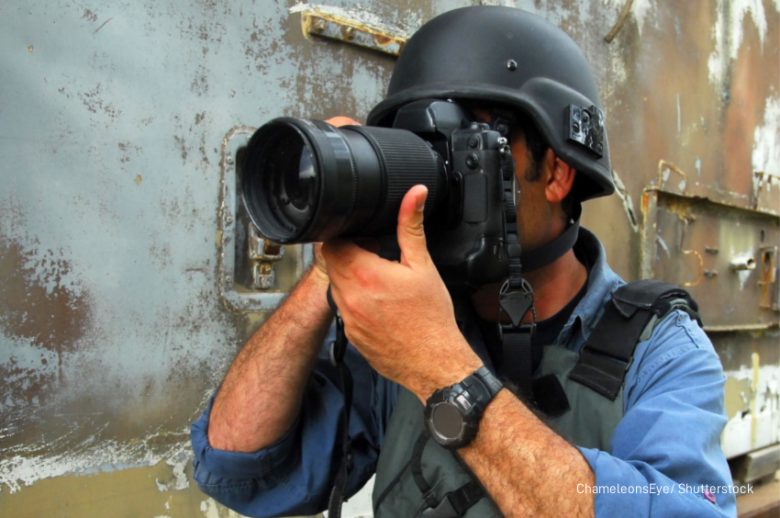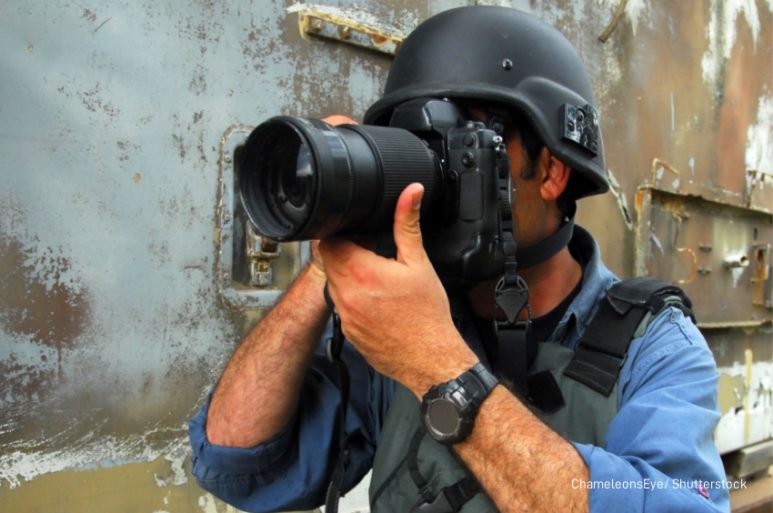The Ma’an Network was created in the late 90s by Palestinian television and radio journalists from the West Bank and the Gaza Strip. They united to defend freedom of expression and to improve the quality of media production in the occupied Palestinian Territories.

Ma’an News agency is one of the network’s key projects. It was created in 2004 with the support of Dutch and Danish governments to produce local news in Arabic, English and Hebrew. Today, due to the economic collapse in the West Bank and Gaza, its only functional news team is the Arabic desk.
MDI: How does the Ma’an News Agency cover the war in Gaza?
Othman: Despite the violence, we still have correspondents in Gaza. Their living conditions are very difficult, and we have lost contact with our cameraman, so we don’t know if he is still alive, but we still get regular news when there is electricity.
Competition is fierce in the media landscape. Arab satellite channels have local correspondents, and if they lose people, others can jump in. They have the necessary funds to cover the war. As local media players, we don’t.
Six hundred dollars is necessary per day to get a journalist and a cameraman to film in Gaza. I can’t afford that amount. International governmental donors have stopped support to us and the local economy is at a standstill. Private revenues, in the form of advertisements, have dried up. Our budget has plunged, and most salaries cannot be paid anymore.
MDI: What are your editorial guidelines?
Othman: International media’s agenda is to talk about the big picture: political developments, the number of casualties, diplomatic positions about Hamas. We are trying to do that too, but we are also determined to tell the stories of the people in Gaza.
Humanizing victims is important, from all sides. People are not just numbers. Now, meeting a person and collecting his/her story requires time and space, which is challenging for us now.
I understand why media report about big numbers, but it contributes to the compassion fatigue that worldwide audiences have towards Palestinians.
MDI: Have you changed the way you work?
Othman: We decided to stop publishing videos to preserve our audience. There is no need to add more to the existing graphic images of bloodshed.
On a human level, and this is true for anyone covering this war, it is affecting us very much and it’s hard to keep up with work when losing a house, family members, and when you don’t have access to food and shelter. We keep a close eye on our correspondents and have provided training sessions in the past to cope with hardship and how to report on sensitive issues.
We are told as journalists to put our feelings aside and try to be objective. We all know the limit of that, especially in war zones, and especially when the violence targets your own population and journalists. The number of journalists being killed while doing their job in Gaza is unprecedented.
The West Bank has not been spared. The Israeli forces are imposing curfews and violence is on the rise. The Israeli army imposes the occupation throughout: people have been recently arrested during an incursion in front of President Abbas’ house. A journalist colleague of mine recently told me about the anger she felt at a point she had never felt before, and how hard it was for her to pass by the army at checkpoints and to keep calm.
The level of hate, tension and fear is at the highest.
MDI: Are you still in contact with Israeli journalists?
Othman: I used to have numerous contacts, on the phone and in person with Israeli journalists. We collaborated on a regular basis. At the beginning of my career, I collected information inside the Palestinian territories for them. I had all the local contacts and access to all parts of the West Bank and Gaza.
Many international outlets based in Jerusalem have Israeli staff in their newsroom. Field staff may be Palestinian who can access the West Bank and Gaza Strip, but editors are Israelis. This has implications on editorial choices.
I don’t have contacts with Israeli journalists anymore which is probably another sign of the deterioration of the situation.
MDI: How do Palestinian get the news on the war?
Mostly from Arab satellite channels al-Mayadeen and Aljazeera. They are the big players. Israeli media are also important. Haaretz is a liberal newspaper. It recently posted a podcast on the use of images of the war. The author follows an Israeli photographer, who said “that Israeli mainstream media barely shows images of what’s happening in Gaza and isn’t regularly reporting on the dire situation in the Strip”.
Haaretz is an exception, it is a unique view on Palestine for Israelis which tries to humanize the other and take a critical look at their own society and government. Outlets in Israel are generally supportive of the current military operations.
Inside Palestine, most local news outlets, such as Ma’an News Agency are facing a major financial crisis, which could lead to permanent closure. It will affect freedom of information, freedom of the press in the Occupied Territories.
We have always worked with support from international government donors and funds from local advertisement. Donor support dropped in recent years because of the international political agenda, and the lack of interest for our region and its conflict. Now, we would urgently need the international community to come back and work again with us, for the benefit of a diversified and free media.
We need to continue reporting locally on our reality. Members of the Ma’an Network have built their audience through the years and have become an important source of information for local and international audiences. We need to carry on.

